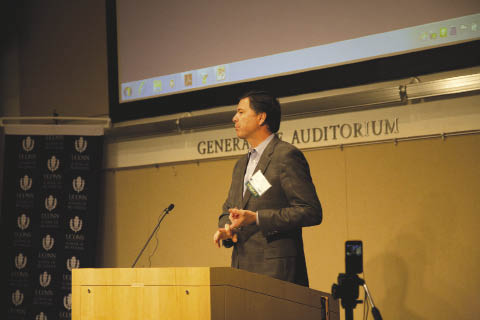
As financial firms bolster compliance and security regimens in the wake of the financial crisis and recent events such as a billion-dollar loss incurred by JPMorgan”™s infamous “London whale,” experts say few fields have benefitted more than risk management.
But according to James B. Comey, general counsel of Westport hedge fund giant Bridgewater Associates L.P. and a former deputy U.S. attorney general, companies”™ surest path to regulatory compliance doesn”™t lie in thicker manuals or more comprehensive training programs, but in ethical leadership from the top.
“Enron had a spectacular training program. Model compliance manuals and programs. And the place stunk to high heaven,” Comey said at a Nov. 9 risk management forum hosted by the University of Connecticut School of Business”™ Stamford campus. “That”™s the tricky thing about culture. It”™s like air ”“ it”™s everywhere. You can”™t see it, you can”™t taste it, and when it goes bad, it goes bad the way air does.”
The problem, said Comey ”“ who as a federal prosecutor investigated the likes of Enron, WorldCom, Adelphia and even Martha Stewart Living Omnimedia over fraud and securities-related charges ”” is that the people in the room often are unaware of the stale air.
At the companies that were investigated by Comey”™s teams of prosecutors, “it stunk unbelievably … and the people in the room ”” many of whom were good people ”” couldn”™t sense it.”
The current focus on white collar crime and fraudulent business activities was largely spurred by the mainstream media, Comey said, resulting in the Justice Department pushing to crack down on the perceived increase in criminal activity.
“You have to care what people think,” he said. “You don”™t need to know whether there is actually an explosion of corporate criminality. If People magazine thinks there is … that matters a great deal to a federal prosecutor.”
With corporate compliance issues increasingly occupying the spotlight as financial markets distance themselves from the recession, coupled with the implementation of regulations prescribed by Dodd-Frank, UConn has instituted and will soon offer a number of courses aimed at educating the next generation of financial professionals, said Business School Dean John Elliott.
“Risk management is going to be a growth industry for the next few years, if not decades,” said Elliott at the Nov. 9 forum.
Elliott highlighted a financial risk management certificate introduced two years ago for students at the Stamford campus, a new undergraduate degree in financial management that will be available starting next fall at UConn Stamford, and a series of advanced business certificates that are currently being developed.
Comey said that above and beyond any training considerations, the tone at the top is paramount, noting that a federal prosecutor”™s involvement likely signals a series of serious missteps by an offending corporation or individual.
“Children are shaped by watching. Our employees are shaped by watching. … The lesson of the Enron era is that prosecutors are necessary but not nearly sufficient, and the most important lesson of the Enron era is protecting your enterprise and reducing risk is about raising those children consciously,” he said.

















